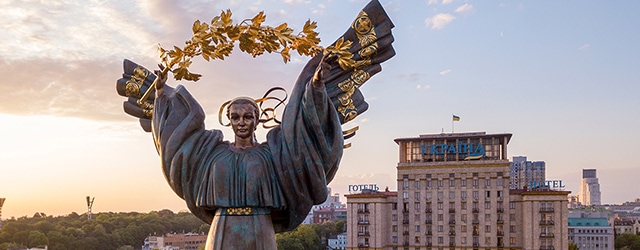Ukraine has its strengths, but geopolitical concerns discourage foreign investors.

|
UKRAINE: VITAL STATISTICS |
|---|
|
Location: Eastern Europe |
|
Neighbors: Russia, Belarus, Poland, Slovakia, Hungary, Romania |
|
Capital city: Kiev (Kyiv) |
|
Population (2017): 44,831,159 |
|
Official language: Ukrainian |
|
GDP per capita (2017): US$2,640, down from $4,030 in 2013 |
|
GDP growth (2017): 2.5% |
|
Inflation (2017): 14.4% |
|
Currency: Hryvnia |
|
Investment promotion agency: UkraineInvest |
|
Investment incentives available? VAT refund system; reduced port fees |
|
Ease of Doing Business rank (2018): 71 |
|
Corruption Perceptions Index rank (2018): 120 |
|
Political risks: North Atlantic Treaty Organization (NATO) membership under discussion; potential for ethnic conflict |
|
Security risks: Risks have discouraged potential international bidders |
|
PROS |
|---|
|
No terrorism $3.9 billion IMF standby agreement |
|
Ukraine-EU trade agreement provides preferential access to the EU |
|
Strong interest in expanding trade ties with the West and the Middle East |
|
CONS |
|---|
|
Ongoing geopolitical strife |
|
Crime |
|
Sometimes-violent political protests |
|
Russian port blockade |
|
Rising budget deficits |
|
Property rights issues |
|
Talent exodus |
|
Increasing political strength of ultra-right |
|
Sources: The Associated Press, BBC, International Monetary Fund, Reuters, United States State Department, Transparency International, World Bank |
|
For more information, check out Global Finance‘s Ukraine Economic Report data page. |
The Ukraine economy recently stabilized out of necessity. “The budget is limited to 2.5% of gross domestic product to comply with its agreement with the International Monetary Fund,” explains Anders Aslund, senior fellow at the Atlantic Council in Washington and a onetime adviser to both Russia and Ukraine. In January, the IMF urged Ukraine to speed up reforms.
With incumbent President Petro Proshenko’s defeat in the April election, Ukrainians have a new hope in President-elect Volodymyr Zelenskiy, whose prior political experience consisted of playing a president on TV.
Ukraine’s economy has three main drivers: “Agriculture is strong and growing all the time,” says Aslund, adding that Ukraine supplies car parts for European car companies. Ukraine also has energy sectors that could be developed or redeveloped, including coal, gas, iron ore and metallurgical companies. “This is something that should come back,” he says.
At the same time, Ukraine faces crippling constraints, with the Russian occupation heading the list. In 2014, Russian forces annexed Crimea and armed groups seized portions of Donetsk and Luhansk. In November, Russia seized three Ukrainian ships in the Black Sea.
Fighting continues at press time, with shelling almost daily. “I’m afraid it’s the kind of thing that’s going to continue for quite some time,” explains Terry Miller, former US ambassador to the United Nations and now director of the Center for International Trade and Economics.
Russia has a heavy influence on Ukraine’s economy, says Anna Borshchevskaya, a senior fellow at The Washington Institute for Near East Policy. The influence is especially strong in strategic sectors such as banking, energy and mobile communications, she tells Global Finance.
Borshchevskaya doesn’t expect any change in Russia’s influence in the near future. Any other outcome would depend on how much pressure the West puts on the Ukrainian government to reform and how much it pushes back on Russia’s aggression, she explains.
Also, Ukraine has a serious corruption problem and struggles with the impulse to preserve the status and income of its oligarchs, according to the United States Department of State. Taken together, these factors have discouraged foreign direct investment. At the time of writing, Ukraine is feuding with Hungary, which may threaten its long-running plan to develop closer relationships with Western Europe—a strategy that drives its desire to join the European Union and the North Atlantic Treaty Organization.
As Ukraine’s next government takes office, Russia’s occupation tops the list of priorities, Miller says. “First of all, they would have to ensure that they’re working on the security issue,” he says. Economic reforms are also necessary, including the elimination of energy subsidies. “That’s a continued drain on the government budget. It’s going to be hard politically to implement that,” Miller says. Ukraine also needs to speed up its shift to a market economy in order to attract FDI, boost wages and reduce unemployment while slowing increases in fuel and food prices.



